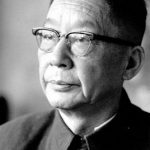 Lao She (pseud. of Shu Qingchun, 1899-1966) was born in Beijing into an impoverished Manchu family. His father, who served in the Imperial Guards during the Manchu reign, was killed in action during the Boxer Rebellion when foreign allied forces attacked Beijing in August 1900. He studied at high schools in Tianjin and Beijin; he spent part of his time studying English at a night school and, later, at Yenjing University. He taught Chinese at the School of Oriental and African Studies in London for five years, beginning in 1924. Much influenced by Dickens, Zola and Conrad, he began his writing career while still in England. He returned to China in 1930 via Singapore and became professor of Chinese at Qilu and Shandong universities. During the War of Resistance against Japan, he joined All-China Resist-the-Enemy Federation of Writers and Artists. After the war, he went to the U.S. as a visiting lecturer for three years. Upon the founding of the PRC, he returned to China and became one of China’s most prolific writers. In 1966 when Mao Zedong launched the Cultural Revolution, he committed suicide after he had been struggled against by the Red Guards. His writings include “Philosophy of Lao Zhang,” “City of Cats,” “Rickshaw,” “Divorce,” “Crescent Moon,” “This Life of Mine,” “Black Li and White Li” and “A Vision.” Lao She (pseud. of Shu Qingchun, 1899-1966) was born in Beijing into an impoverished Manchu family. His father, who served in the Imperial Guards during the Manchu reign, was killed in action during the Boxer Rebellion when foreign allied forces attacked Beijing in August 1900. He studied at high schools in Tianjin and Beijin; he spent part of his time studying English at a night school and, later, at Yenjing University. He taught Chinese at the School of Oriental and African Studies in London for five years, beginning in 1924. Much influenced by Dickens, Zola and Conrad, he began his writing career while still in England. He returned to China in 1930 via Singapore and became professor of Chinese at Qilu and Shandong universities. During the War of Resistance against Japan, he joined All-China Resist-the-Enemy Federation of Writers and Artists. After the war, he went to the U.S. as a visiting lecturer for three years. Upon the founding of the PRC, he returned to China and became one of China’s most prolific writers. In 1966 when Mao Zedong launched the Cultural Revolution, he committed suicide after he had been struggled against by the Red Guards. His writings include “Philosophy of Lao Zhang,” “City of Cats,” “Rickshaw,” “Divorce,” “Crescent Moon,” “This Life of Mine,” “Black Li and White Li” and “A Vision.” |